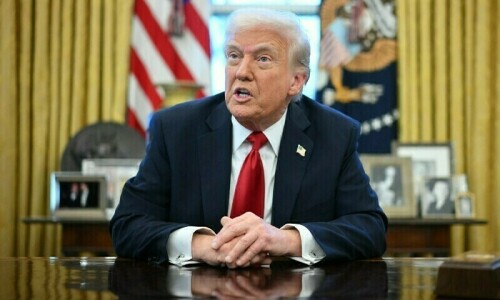THE Muslim world — a vast construct of over 1.5 billion souls stretching from Southeast Asia to the Sahara — is today facing a unique series of tumultuous events.
Extremist militants have unleashed an orgy of violence across vast swaths of the Middle East, Asia and Africa.
On Friday, the militant Islamic State group claimed responsibility for a suicide attack near Karbala in which around 30 people were killed, while a day before the East African terrorist group Al Shabab had stormed a military base in Somalia, slaughtering around 70 people.
Only days earlier, the IS had made its first major inroads in Iran, attacking parliament and Ayatollah Khomeini’s tomb complex in Tehran.
Apart from these atrocities within Muslim-majority lands, terrorists have also struck the UK, France and other states in recent weeks.
But, instead of combining forces against the menace of terrorist violence, the rulers of Muslim lands appear too busy in acrimonious exchanges and petty rivalries.
The Saudi-Iran spat was already a matter of serious concern, spreading beyond the borders of these lands and affecting sectarian relations in other states.
Moreover, the message sent from the Arab-Islamic-American Summit last month in Riyadh was not one of unity and progress, but of divisiveness and confrontation, as Iran was pointedly excluded from the comity of Muslim states.
In the days since, tensions between Qatar on one side and Saudi Arabia and the UAE on the other have exposed even more rifts and divisions within the Islamic bloc.
The message this confrontation is sending is that despite the dangers posed by extremists, the rulers of Muslim countries are far too obsessed with infighting and power plays, as their societies implode.
The scenario may be grim but not beyond repair.
There is still time for rulers of Muslim nations to shun their petty differences and forge unity to face the monumental challenges that confront them.
Narrow considerations of sect, nationality, race and tribe will have to be jettisoned for the welfare of over 1.5bn people.
While major geopolitical differences exist between Muslim states and cannot be papered over, these should be discussed through diplomatic channels in measured tones, not played out in front of the gallery.
Muslim states must shun propaganda campaigns against each other as irresponsible and combative talk can very easily spark something far more dangerous in these combustible times.
The challenge ahead is quite clear: there are serious internal weaknesses to be addressed while states cannot be excluded on the basis of sect.
Without being unduly alarmist, it can be said that terrorist groups such as the IS pose an existential threat to nearly every Muslim nation, as well as to other states.
Therefore, the prime goal at this juncture can only be to join forces and to use energies collectively to combat the menace of terrorism.
Published in Dawn, June 12th, 2017












































